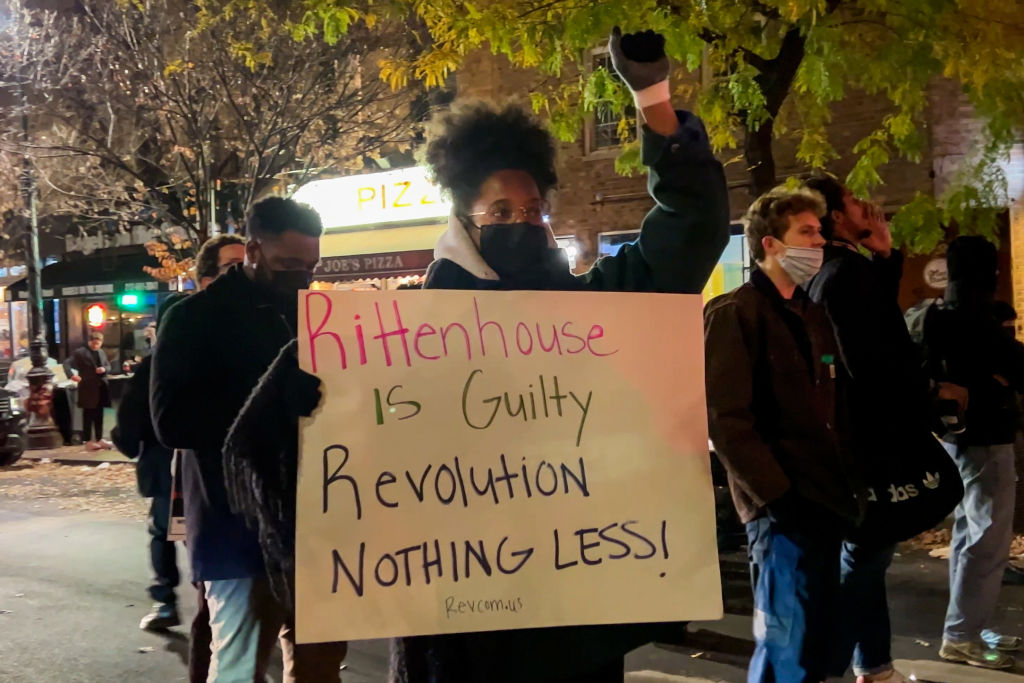Ukraine and the American Future

We must reclaim our tech and our humanity from what our failing rulers wrought.
However the conflict in Ukraine now unfolds, it has already revealed how deeply and extensively America’s ruling factions have failed. For many, the revelation is a shock; for many others, an all too accurate forecast come true—and a long-delinquent bill come due.
Every faction vying for control of our country shares in responsibility for the present situation and everything that will come with it. Neoliberals, convinced “soft” economic power could be used to weave a “rules-based international order” that would pacify the world, refused to recognize the flaws and shortcomings of their approach, rooted in an optimism that careened from the naïve to the cynical—and refused to relinquish power when their methods did not deliver. Neoconservatives, devoted to the foreign policy of color revolutions and infowar, met the global collapse of their strategy at blistering cost with a seamless pivot to fruitlessly bellicose rhetoric and posturing.
The woke vanguard, to whom both the neolibs and neocons have increasingly capitulated, have twisted America’s strategy and identity to the point where, to discredit and demoralize us, our adversaries need only hold up a mirror to the institutionalized decadence, incompetence, perversity, and self-loathing that the woke have made our regime’s established religion.
And our globalized military-intelligence complex—which includes not only our rights-defying three-letter agencies and the Five Eyes borg but the Big Tech companies used to delete the difference between foreign and domestic modes of surveillance and control—has failed supremely to meet the duties and obligations of national security. Our armed services lack a basic vitality. Our inability to win wars and afford them has become characteristic. The resultant shift to an overreliance on technology to wage spiritual, psychological, and cultural war against geostrategic rivals has been transparent, illegitimate, and unsuccessful.
Sadly, adding immeasurably to the dangers we face as a result of these compounded failures, even the primary critics of our ruling factions are proving themselves unable to grasp the nature of the world today and our predicament within it.
Some have become so disenchanted by the degeneracy of the West that they now openly simp for China, singing the praises of a regime enclosing its uniform subjects within a cyborg system utterly incompatible with America’s form of government and way of life. Despite the benefits Beijing has reaped of corrupt and delusional Western faith in pumping China full of money, its civilization is utterly and unchangeably unlike America’s own. China is not and will never be a model or a template for Americans.
Nor will Russia. Though the long-suffering Russian people have demonstrated the power of Christian faith and human resolve to survive the catastrophic implosion of political superpower—a lesson many Americans are taking increasingly to heart—Russia’s civilization draws from fundamentally different roots from our own. Imitating Putin or Moscow will not provide a shortcut to salvation for America as we face our own daunting reckoning. The only path forward for America is as America, consistent with our own deepest civilizational roots.
And contrary to the wishes of some “trads” who hope to renounce the inescapable burdens of friend and enemy defining our political and military existence, America cannot exercise a geopolitical Benedict Option. Without doubt, many Americans will increasingly feel they must turn radically inward together to save not the world but their souls. Yet America is a country, not a person. We have real adversaries and real enemies, and, still more important, an attempt to escape the profane and all too human world will only cede ever more territory and influence to civilizations not our own, incompatible with our way of life, our form of government, and our natural rights.
The dream of escape from reality promoted by the worst of our tech utopians threatens America and American life in a similar way, only worse. Instead of turning inward and asking God to take away the violent and painful responsibilities of life on Earth, the tech utopians turn outward, relentlessly manufacturing digital entities meant to surpass or merge with our consciousness and become a new, all-powerful god on Earth. Already we have seen the punishing effects of this supposed form of perfected deliverance—and its seizure by the West’s woke autocrats, who wish to use it to cement their perpetual transformative control over the most intimate details of our identities and our lives.
What is needed to face this perfect storm of spiritual war, waged by corrupt and decadent factions against America as we have known it, is not anything more or less radical that a restoration of constitutional republican government, fully protective of the natural rights of human American citizens, through new institutions and organizations that can keep America America even in our digital age. To do this, we must recognize that American civilization is unique and good. Preserving our civilization will require us to ensure that ordinary Americans freely and fully use our most foundational digital technologies consistently with the foundational theology of our civilization.
Unlike other civilization-states, which are rushing to reestablish their sovereignty in the digital age by making official their most deeply rooted religions, America has a political theology that bars a formal religious establishment. That means we must tolerate a degree of religious pluralism to avoid both religious war and theocratic tyranny. But it also means that we must ensure our political system and our regime are not hostile to the free majority exercise of natural rights and technological capabilities that are consistent with and reinforced by our civilization’s foundational theology. That theology is summed up in our founding documents as one where our humanity is a sacred gift from God, one that naturally bears properties whose political protection is justly demanded of our government and its laws.
This simple proposition has led to its share of controversy and conflict. But it has remained remarkably durable amid harrowing and whipsawing waves of epochal, relentless change. Today it means that among the recognizably natural rights inherent to American’s sacred humanity are rights to freely use and bear certain fundamentally powerful digital techonlogies—among them the Bitcoin computational protocol and blockchain, cryptocurrencies and tokens, high-powered GPUs, and encrypted communications apps. The acquisition and use of these digital technologies must not be infringed, on pain of America ceasing to be America and becoming the autocratic cyborg social credit regime we have seen so swiftly crawl into our lives across the Anglosphere. The protection of Americans’ digital rights requires safeguards against the establishment of that regime through coercive and arbitrary measures such as secret and extralegal mass surveillance, market capture by state-sponsored trusts, algorithmic censorship of disfavored political opinion, and digital freeze-and-seize actions taken against wallets and accounts. And constitutional law must protect Americans from the legal establishment of the theology behind the regime, which rejects the goodness of our divinely-given natural humanity and the existence of the inalienable rights which issue from it. This theology instead views humanity and technology as two classes of entity properly combined and organized together within a single cybernetic architecture. Whether wrapped in the banner of “the science” or of woke “ethics”—or both, as it so often is today—the cyborg theocracy is more of a threat to us than even the hostile plans of the rival civilization-states which have now taken the full measure of our weakness and intend to make us pay for the way we used our strength.
Americans know they are in for a hard road ahead—it has been a hard road for decades and generations. Once perfectly at home with their technologies, as publishers, tinkerers, inventors, mechanics, electricians, welders, and on and on, Americans now largely feel alienated from their most powerful machines. Many fear those machines have slipped their comprehension no less than their grasp, and fallen into the exclusive hands of an elite that not only hates them and their way of life but their soul, their nature, their very humanity. As technology continues to reorder the world away from the fantasies Americans were misled to believe in, it is paramount that lawmakers at the federal and state level rescue our political, technological, and spiritual health by urgently and carefully crafting and passing one or more Digital Rights Acts. Without them, our characteristic daily labor of building and maintaining our world, our culture, and our markets—the activity without which those things swiftly decay and disappear—will become impossible, and we will slip into a subhuman servitude which neither our country nor our souls will endure.
The American Mind presents a range of perspectives. Views are writers’ own and do not necessarily represent those of The Claremont Institute.
The American Mind is a publication of the Claremont Institute, a non-profit 501(c)(3) organization, dedicated to restoring the principles of the American Founding to their rightful, preeminent authority in our national life. Interested in supporting our work? Gifts to the Claremont Institute are tax-deductible.
The aftermath of the Rittenhouse trial exposes a bitter divide across the nation.
War with Russia over its expansionist rumblings would be a disaster.



